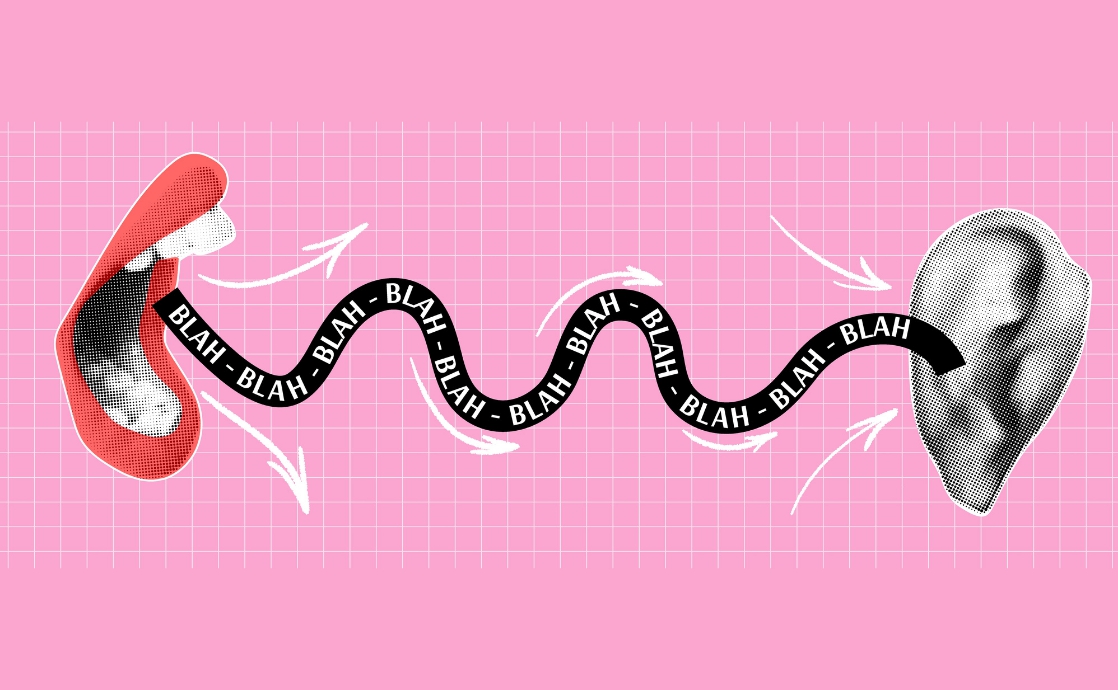The views expressed in our content reflect individual perspectives and do not represent the authoritative views of the Baha'i Faith.
When you think of a good friend, what do you think of? A person who is honest? Trustworthy? Humble?
Most people would say all three of these are the qualities of an ideal friend. But despite holding these qualities in such high esteem, our wider culture often promotes behaviors that are in stark contrast.
In an effort to push back against the grain, as I wrote my lengthy list of New Year resolutions, I jotted down that I would “renew my focus on not talking about people behind their backs.” Now, for me, these lists are always so much fun to write. I am huge on lists, and when the list is focused on finding ways to improve emotional and spiritual health, my excitement is doubled.
But I have realized that my lists often look similar: they repeat and reword the same things, and don’t always lead to action. So I’ve decided that for this issue of backbiting, it might be helpful to understand how and why it is so difficult to knock the habit.
… backbiting quencheth the light of the heart, and extinguisheth the life of the soul. – Baha’u’llah, Gleanings from the Writings of Baha’u’llah, p.265.
As I reflect on this passage from the Baha’i writings, I feel more urgency to better understand the root causes and possible responses to what underlies this habit.
Backbiting and Celebrity Culture
It seems like everyone has a natural desire to worship, but many people have moved away from worshiping through religion, scarred by how a religious community treated them or how they’ve watched religious communities treat others. Naturally, as people see religious text distorted by human frailty, they are pushed away. Some feel unable to even worship a higher power at all.
This reality, combined with materialism and other factors, has made celebrity culture flourish. We naturally want to worship something, to have examples for what we should try to be like, to have outlines for the goals we should set. And while they are not ideal, celebrities can seem to fulfill all of those needs. When we watch them, we often mistake their fame for love, talent for superiority, and financial comfort for happiness.
How is this tied to backbiting? Well, in order for us to follow or worship celebrities we tend to talk about them. We talk about them with our friends, in our news outlets, on Twitter, Instagram, and Facebook. We don’t seem to get enough. Whether it be critiquing or praising, we spend copious amounts of energy following the moves of others.
This culture bleeds out of the world of media and into our daily lives. Celebrity culture has become so prevalent that we even put people who aren’t celebrities on pedestals in work places, religious spaces, schools, and social media.
Call-Out Culture
Along with the ways that celebrity culture flourishes in social media, other cultures that inadvertently contribute to its pervasiveness also thrive.
In the realm of social justice, people are on fire with a passion to spread awareness about the injustices that all too often go overlooked. We want to find efficient ways to release our pained responses to racism, rape culture, toxic masculinity, and other forms of oppression. And we often turn towards calling out the face of a problem.
Since we already have an awareness of high-profile individuals, we are more attentive to their missteps. This is not to belittle the missteps that many celebrities are called out for—many of them have grossly harmed or oppressed people—but when does calling them out merely become gossip?
Is there a way to address the wrongdoings of others for the sake of justice and then move on? What happens after the ‘call-out’? Sometimes we get so caught up in exposing the face of problems that we forget how much energy, effort, and thought needs to go into creating solutions that address their roots.
We also get sucked, yet again, into focusing on what others are doing, and then talking about it until we are blue in the face. Though raising awareness is undoubtedly crucial in unearthing the rotten parts of our society, we also have to find ways to respond effectively and not just quickly to what is wrong.
Friendships Based on Gossip
Like many relationships, the way that we start our friendships can set the tone for what follows. In an effort to achieve a higher level of emotional intimacy with a new friend, we open up. And sometimes we bond over our annoyance with a co-worker, supervisor, or mutual acquaintance.
Later in the friendship, we are faced with new struggles, and turn to coping mechanisms like ‘venting’. Most of us are probably familiar with this way of dealing with stress. I am a social worker, and naturally I am a huge fan of addressing how you feel and acknowledging the details of what is causing your feelings, but I’ve realized that in my own venting, the conversation often morphs into petty judgment.
Aside from becoming a distraction from actual productive work like deciding on the next steps in a stressful situation, venting pulls someone into a place of comparison. When we talk badly about someone else, the unspoken addendum to our statement is usually something like “and I am nothing like that” or “I am so much better than that” because otherwise, why would we feel we can judge? This makes it so that we become even less aware of our own shortcomings, and more aware of those of others. And naturally, we are less able to grow.
One must see in every human being only that which is worthy of praise. When this is done, one can be a friend to the whole human race. If, however, we look at people from the standpoint of their faults, then being a friend to them is a formidable task…. Thus is it incumbent upon us, when we direct our gaze toward other people, to see where they excel, not where they fail. – Abdu’l-Baha, Selections from the Writings of Abdu’l-Baha, p.169
So, what now?
These are just a few practical steps I think might be helpful in my own process:
- Recognize when a conversation is turning towards praising or criticizing someone we do (or don’t) know well and then rerouting the conversation if it is.
- Still speak out about social injustice, but try to look at what should be done and avoid limited focus on what others have done.
- Remember and verbally acknowledge that even the most problematic people are, in part, fruits of a wider problem within our society. Taking emphasis off of individual wrongdoings allows us to employ more effective solutions.
- Catch myself in my conversations with friends and family about what is stressing me out and try not to talk about others in judgmental ways. Though it may be a difficult shift in behavior and thought, it’s possible to ask for the support and advice without falling to judgment.
He must never seek to exalt himself above anyone, must wash away from the tablet of his heart every trace of pride and vainglory, must cling unto patience and resignation, observe silence, and refrain from idle talk. – Baha’u’llah, The Book of Certitude, p. 193
















Comments
Sign in or create an account
Continue with Googleor